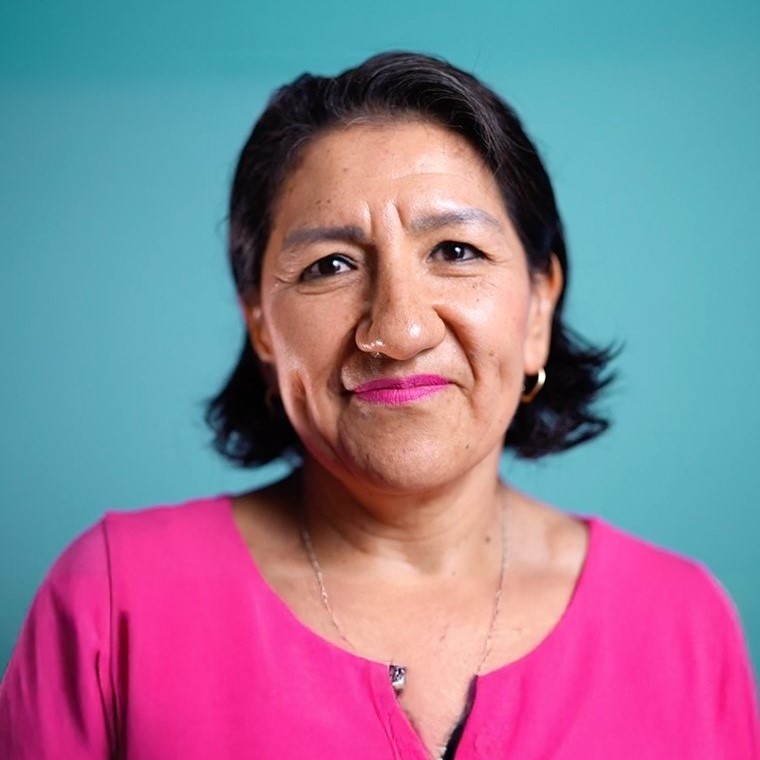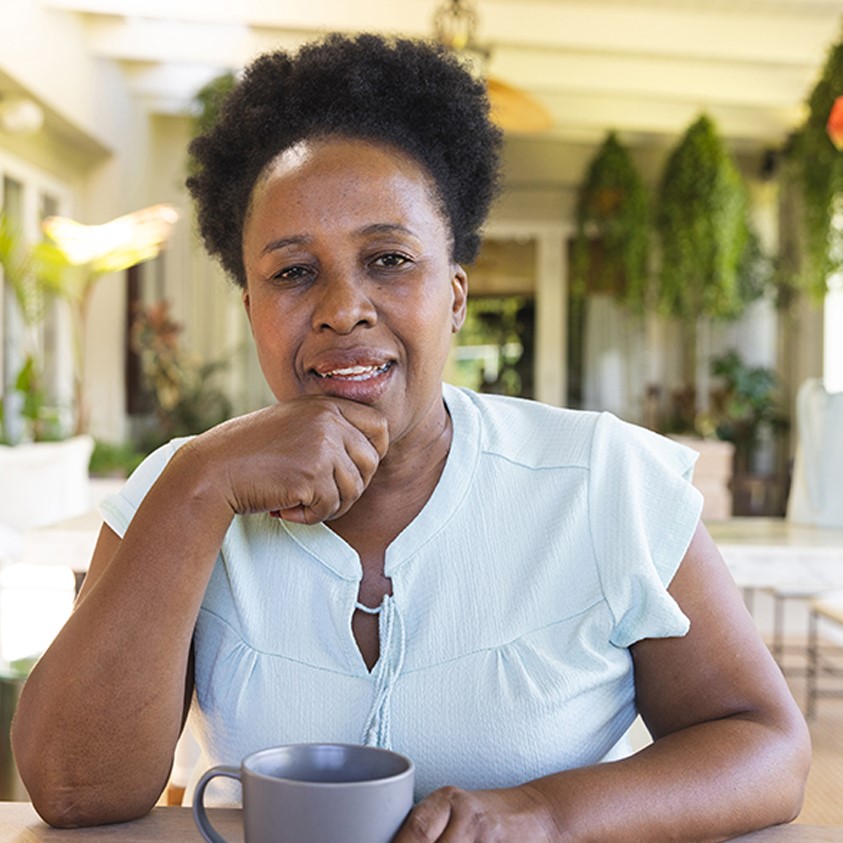RECOGNISING SYMPTOMS
- Home
- >
- Recognising symptoms
Menopause has a surprisingly wide range of symptoms and ways in which it can affect your body.
Whether you’re currently in menopause, supporting someone going through menopause or you just want to get prepared for this future chapter of your life, this symptom education page is designed to elevate your knowledge.
WHAT ARE THE SYMPTOMS OF MENOPAUSE?
Using the filters below, explore the wide range of possible menopause symptoms and how they could affect your body and mind.1-21
Overcoming menopause myths
With so much information out there about menopause, it can be hard to know what to trust and believe. Hear from leading women's health experts who are helping to bust some common menopause myths by providing information you can trust.
Click on a myth card to reveal the expert’s opinion.

MYTH
Menopause management only refers to medical treatments.

TRUTH
Menopause management can encompass several different things, from hormone treatments through to changes to your diet and exercise. “Hormone treatment is only one part of this. You can do a lot of this yourself with regards to your lifestyle, such as physical activity.” – Angelica Linden Hirschberg, Professor of Obstetrics and Gynaecology, Stockholm.

MYTH
Hormone treatments are still fairly new.

TRUTH
Hormone replacement therapy has been available in some countries for >60 years and has been tested in many clinical trials and studies over the years.22 “Hormone replacement – the idea of taking hormones to feel better – is a very old one. It started taking off in the 19th century. The idea was to preserve your physical integrity. We’ve come a long way from there now as we now have oestrogens that are identical to the ones that we would be producing ourselves.” – Mark Brincat, Professor of Obstetrics and Gynaecology, Malta.

MYTH
Every woman will experience the same menopause symptoms.

TRUTH
There are many different symptoms of menopause and every woman’s experience is unique. The amount of time a woman is in each phase of menopause can vary. “Some women need X, some need Y, some need Z. We need to be careful to determine what’s best for her symptom wise and for general health.” – James Simon, Professor of Obstetrics and Gynaecology, Washington, USA.

MYTH
Women don’t need to be informed about menopause or treatment options.

TRUTH
If you want to feel empowered to take an active role in your healthcare decisions, it is important that you are well informed about menopause, from symptoms and diagnosis through to management options and lifestyle changes. “The demand from [women] is getting higher to be given lots of different choices and a quality of conversation that help them to understand how the risks and benefits apply to them… we’re starting to see a real need for more information” – Angela Wright, BMS Advanced Menopause Specialist, UK.
DISCOVER REAL WOMEN'S MENOPAUSE STORIES
Most women will experience menopause between the ages of 45 and 55 and women who are aged 50+ make up around 26% of all women across the world.23 With such a wide range of possible symptoms, every woman’s experience will be unique to them. Explore some of their stories below to find out more about how menopause symptoms could impact your daily life.
“Menopause hit me with severe symptoms… recovery from my [mountaineer] training became challenging.”
Australian mountaineer Allie Pepper has challenged herself to summit all 14 of the world's 8,000+ metre peaks without supplemental oxygen in the shortest ever recorded time. Hear her experience of menopause symptoms and how this impacted her training.
Explore menopause diagnosis
- NHS. Menopause: symptoms [Internet]. Available at: https://www.nhs.uk/conditions/menopause/symptoms/ Last accessed October 2024.
- Alblooshi S, Taylor M, Gill N. Does menopause elevate the risk for developing depression and anxiety? Results from a systematic review. Australas Psychiatry. 2023 Apr;31(2):165-173.
- Health Direct. Menopause [Internet]. Available at: https://www.healthdirect.gov.au/menopause Last accessed October 2024.
- Health Direct. Bloating [Internet]. Available at: https://www.healthdirect.gov.au/bloating Last accessed October 2024.
- Maki, P, Jaff, N. Brain fog in menopause: a health-care professional’s guide for decision-making and counseling on cognition. Climacteric. 2022:25(6), 570–578.
- HCA. 18 signs of the menopause that you might have missed [Internet]. Available at: https://www.hcahealthcare.co.uk/Blog/18-signs-of-the-menopause-you-might-have-missed Last accessed October 2024.
- Mayo Clinic. Perimenopause [Internet]. Available at: https://www.mayoclinic.org/diseases-conditions/perimenopause/symptoms-causes/syc-20354666 Last accessed October 2024.
- Skoczek-Rubińska A, Chmurzynska A, Muzsik-Kazimierska A, Bajerska J. The Association between Fat Taste Sensitivity, Eating Habits, and Metabolic Health in Menopausal Women. Nutrients. 2021:16;13(12):4506.
- NHS Inform. Menopause and your mental wellbeing [Internet]. Available at: https://www.nhsinform.scot/healthy-living/womens-health/later-years-around-50-years-and-over/menopause-and-post-menopause-health/menopause-and-your-mental-wellbeing/ Last accessed October 2024.
- Terauchi M, Odai T, Hirose A, Kato K, Akiyoshi M, Masuda M, Tsunoda R, Fushiki H, Miyasaka N. Dizziness in peri- and postmenopausal women is associated with anxiety: a cross-sectional study. Biopsychosoc Med. 2018:12;12:21.
- Avis NE, Crawford SL, Green R. Vasomotor Symptoms Across the Menopause Transition: Differences Among Women. Obstet Gynecol Clin North Am. 2018 Dec;45(4):629-640.
- Mayo Clinic. Hot flashes [Internet]. Available at: https://www.mayoclinic.org/diseases-conditions/hot-flashes/symptoms-causes/syc-20352790 Last accessed October 2024.
- NHS. Osteoporosis: overview [Internet]. Available at: https://www.nhs.uk/conditions/osteoporosis/ Last accessed October 2024.
- Finkelstein JS, Brockwell SE, Mehta V, Greendale GA, Sowers MR, Ettinger B, Lo JC, Johnston JM, Cauley JA, Danielson ME, Neer RM. Bone mineral density changes during the menopause transition in a multiethnic cohort of women. J Clin Endocrinol Metab. 2008 Mar;93(3):861-8.
- John Hopkins Medicine. Sex after menopause [Internet]. Available at: https://www.hopkinsmedicine.org/health/wellness-and-prevention/how-sex-changes-after-menopause Last accessed October 2024.
- Bupa. Night sweats and disturbed sleep after the menopause [Internet]. Available at: https://www.bupa.co.uk/newsroom/ourviews/night-sweats-menopause Last accessed October 2024.
- NHS. Urinary tract infections (UTIs) [Internet]. Available at: https://www.nhs.uk/conditions/urinary-tract-infections-utis/ Last accessed October 2024.
- Maltais ML, Desroches J, Dionne IJ. Changes in muscle mass and strength after menopause. J Musculoskelet Neuronal Interact. 2009;9(4):186-97.
- Dutt P, Chaudhary S, Kumar P. Oral health and menopause: a comprehensive review on current knowledge and associated dental management. Ann Med Health Sci Res. 2013;3(3):320-3.
- Hao S, Tan S, Li J, Li W, Li J, Liu Y, Hong Z. The effect of diet and exercise on climacteric symptomatology. Asia Pac J Clin Nutr. 2022;31(3):362-370.
- Rinaldi F, Trink A, Mondadori G, Giuliani G, Pinto D. The Menopausal Transition: Is the Hair Follicle "Going through Menopause"? Biomedicines. 2023: 14;11(11):3041.
- Women’s Health Concern. HRT: the history [Internet]. Available at: https://www.womens-health-concern.org/wp-content/uploads/2022/11/10-WHC-FACTSHEET-HRT-The-history-NOV22-A.pdf Last accessed October 2024.
- World Health Organization. Menopause [Internet]. Available at: https://www.who.int/news-room/fact-sheets/detail/menopause Last accessed October 2024.




